Frauds & Scams
There are many types of scams and variations on scams, but here are six common examples that all consumers should recognize and avoid.
Protect yourself by knowing how to avoid being a victim of consumer fraud. Read the Consumer Protection Unit's press releases on scams that may be targeting Alaskans.
Visit Fraud.org, formerly the National Fraud Information Center, which was originally established in 1992 by the National Consumer League, the oldest nonprofit consumer organization in the United States, to educate consumers about telemarketing and internet fraud and enforcement.
Imposter Scams
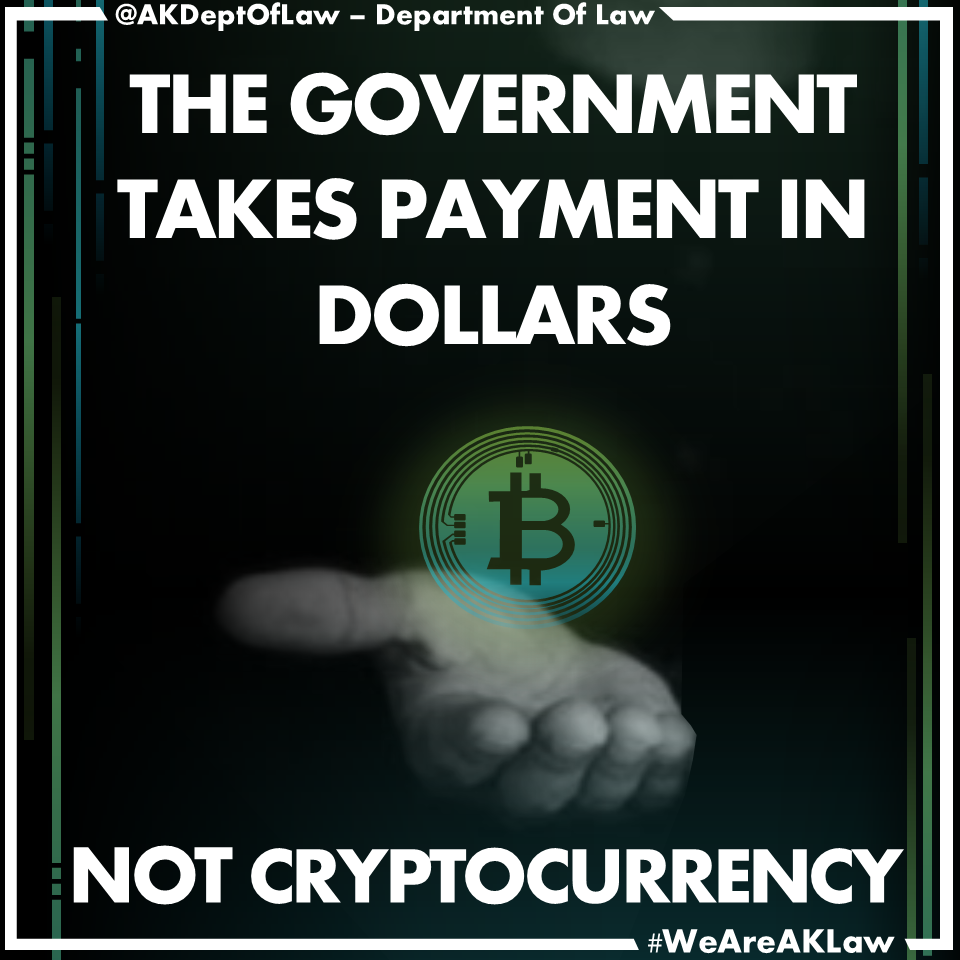
The Government Takes Payment in Dollars Not Cryptocurrency
Foreign scammers are calling Alaskans pretending to be U.S. Marshalls, the IRS, or other government agents. They use “spoofing” technology to trick your caller ID into claiming they are calling from a real government phone number. The scammers will tell you that you need to make a payment using a Crypto ATM. Once you make the payment your money is moved to a foreign country, and it is unlikely to be returned. Real government agents will never demand that you pay them in cryptocurrency. If someone claiming to be a government agent tells you to use a crypto ATM to pay them, hang up the phone!
The "Warrant" Scam
Have you heard or read this: There’s a warrant out for your arrest, do this or go to jail. That’s a scam. Any threat like this is a lie. Nobody needs money or information to keep you out of jail. Yet people in Alaska and elsewhere are falling victim to it because of the Act Now panic that the scammer sets in. Here’s some things to consider:
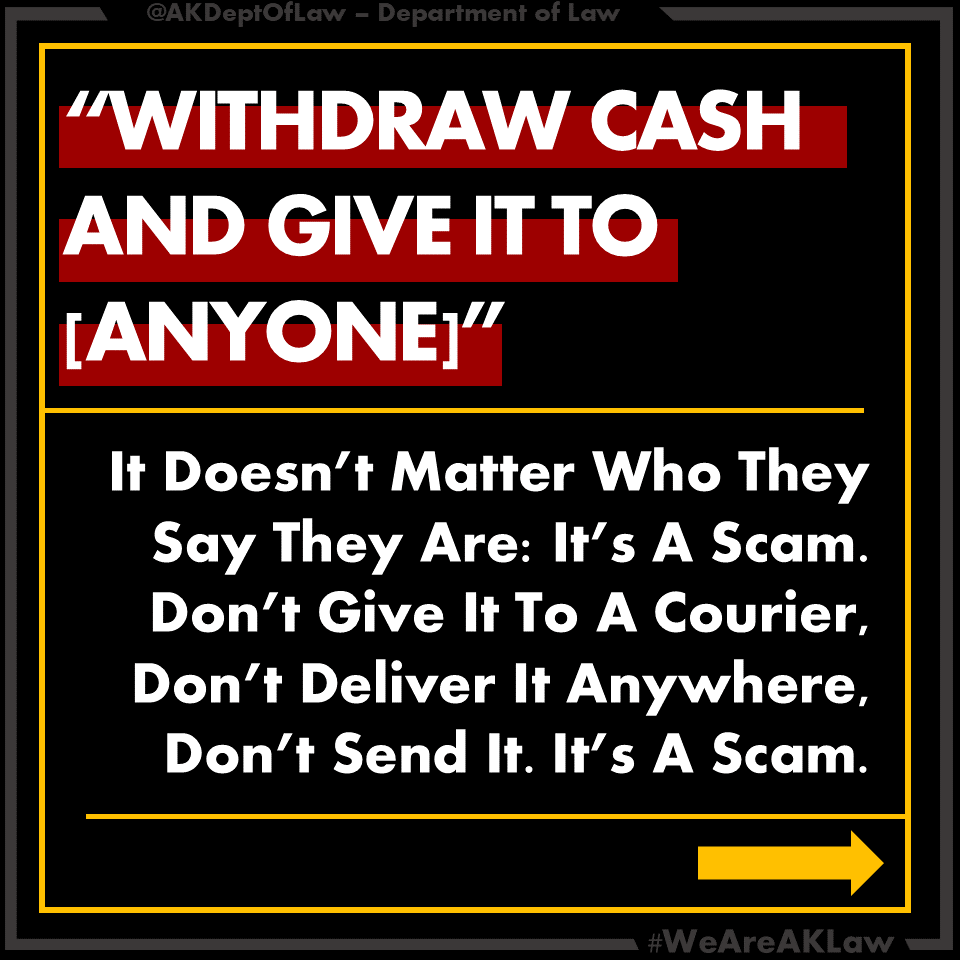
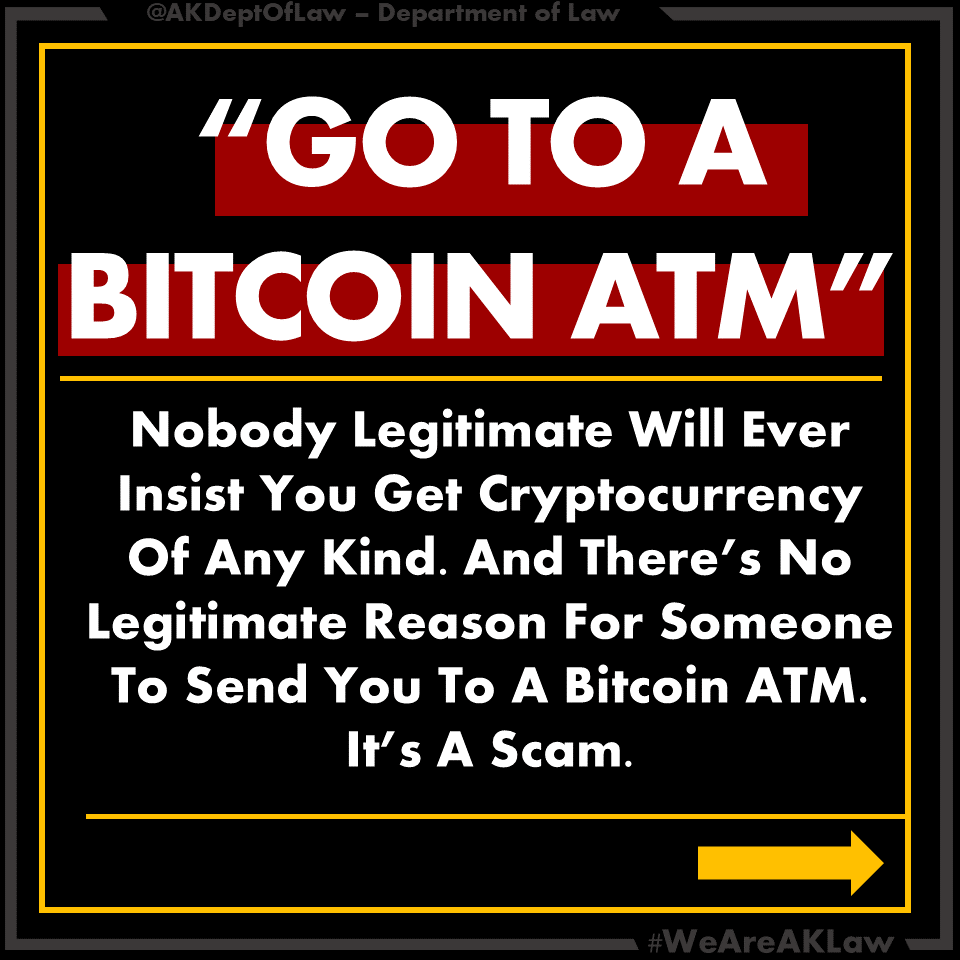
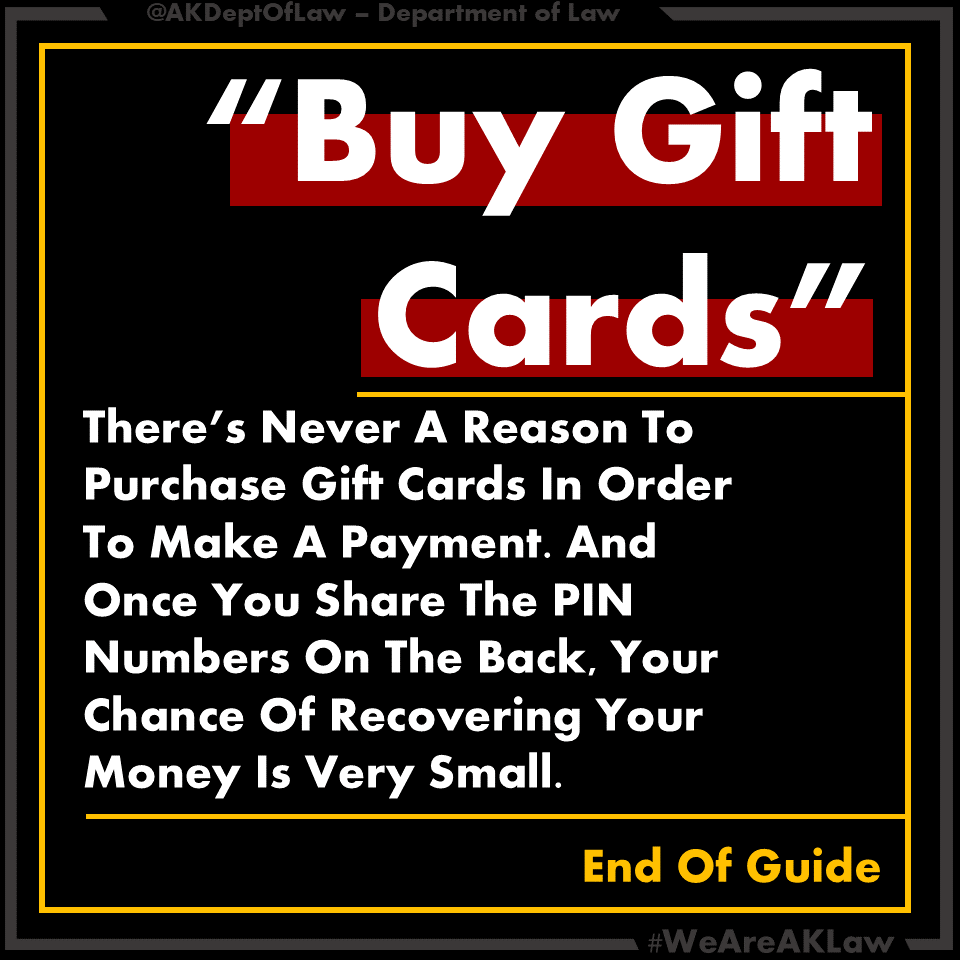
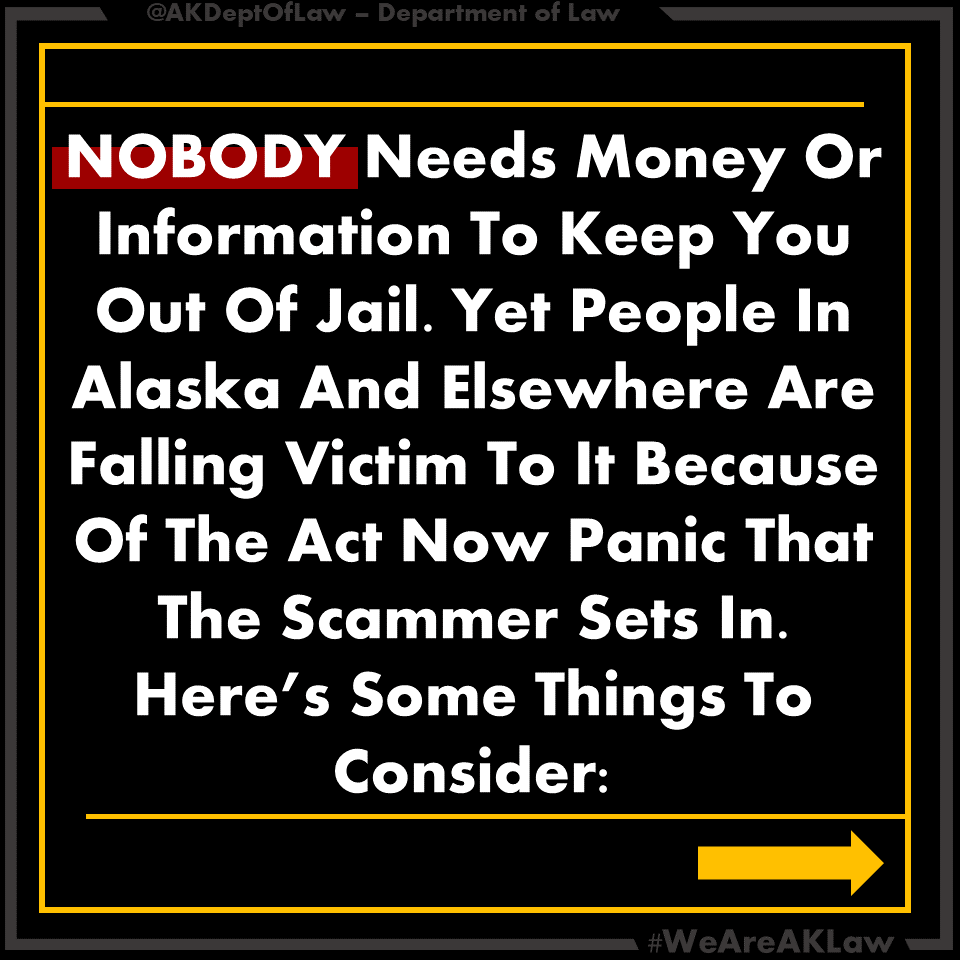
- “Withdraw cash and give it to [anyone]” is a scam. Doesn’t matter who they say they are: it’s a scam. Don’t give it to a courier, don’t deliver it anywhere, don’t send it. It’s a scam.
- “Go to a Bitcoin ATM” is a scam. Nobody legitimate will ever insist you get cryptocurrency of any kind. And there’s no legitimate reason for someone to send you to a Bitcoin ATM. It’s a scam.
- “Buy gift cards” is a scam. There’s never a reason to purchase gift cards in order to make a payment. And once you share the PIN numbers on the back, your chance of recovering your money is very small.
When you get the text or the call or the email or the mail, stop and think: is this a scam?
Advanced Fee Fraud
You've won $10,000 in the Australian Sweepstakes! All you have to do is pay $2000 to cover taxes and the winnings will be yours. Great news? No, it's a type of scam known as advance fee fraud. Scam artists send official-looking announcements or call you to congratulate you on your winnings in a lottery or sweepstakes. They tell you to send a payment to cover taxes or customs fees, or that you need to verify your bank account information so the money can be wired to you. Shred these phony announcements and hang up on anyone who calls with this pitch. You should never pay any money in advance to get a prize, winnings, a loan, or a credit card.
The "Nigerian" letter or "4-1-9" scam is another common example of advance fee fraud. The scam artist poses as a government official, bank employee, or wealthy individual in a foreign country who has selected YOU to help move a large sum of money to an account in the United States. You are told you will be handsomely rewarded for your effort and all you have to do is provide your bank account number or pay a fee to cover "transfer costs" or some other made-up fee. Inevitably, some emergency comes up and you are asked to make additional payments, and then the scam artist vanishes with your money.
If you receive a "Nigerian" scam email, forward it to spam@uce.gov, a site maintained by the Federal Trade Commission. If you've lost money to this scheme, call the Secret Service's Anchorage Field Office at 907-271-5148.
Fake Check Scams
It is so easy for crooks to create checks that look like real cashier's checks or checks from businesses that even bank employees can be fooled. Fake checks are used in a variety of scams, such as sweepstakes, internet auction fraud, and work-at-home schemes. Scam artists make up elaborate stories to persuade you to deposit the check and wire back some or all of the funds. You wire the money but the winnings, prizes, goods, or earnings never appear and the scam artist vanishes. Weeks later the bank informs you that the check was bogus, and the bank deducts the amount that was credited to your account. If there isn't enough to cover it, the bank may be able to take money from other accounts you have with the bank or sue you to recover the funds. If you receive a check from an unfamiliar person or business, be skeptical. There is no legitimate reason for someone who is giving you money to ask you to wire money back.
For more information:
- Giving the Bounce to Counterfeit Check Scams - PDF(352K)
- Sample fake check lottery solicitation - PDF(192K)
Phishing
"Phishing" occurs when Internet fraudsters send an email or pop-up message that claims to be from a business, organization, or even a government agency that you may deal with. The message states that there is a problem with your account and directs you to a website that looks just like the legitimate organization's website. But it is a fake website designed to trick you into revealing your account information, passwords, or other personal information.
To avoid being hooked by a phishing scam, never reply to an email that asks for personal information, and don't click on links in an email of this type. Legitimate organizations don't ask for account information or personal information by sending you an email. If you are concerned about your account, contact the business or organization using a telephone number that you know is legitimate (not the number in the suspicious email!). You can forward phishing email to the Federal Trade Commission at spam@uce.gov, and to the company, bank, or organization impersonated in the phishing email.
For more information:
Pyramid Schemes
Participants in a pyramid scheme are led to believe that they can make money from the "investments" paid by new recruits into the program. Participants are promised huge returns in a short period of time. The pyramid promoters will often go to great lengths to make the program look like it is a legitimate multi-level marketing program or they will say it is a legal "gifting" program. The schemes often have names like The Dinner Party, Friends Helping Friends, or the Airplane. The fraudsters use the money coming in from new recruits to pay of early investors, and at some point the pyramid will collapse because the promoter cannot raise enough money from new investors to pay off early investors, and many people will lose their money.
For more information:
Investment Scams
"These gas wells are guaranteed to produce $6,800 a month in income. Some of the most successful investors in the country are interested in these wells. There are only two units left in this project, so you must act now."
If someone tells you you can strike it rich by investing in oil and gas wells, buying gold coins, or investing in any other scheme where they say you'll get rich quick with little or no risk, beware. Don't invest until you investigate!
If you have questions about investments, visit Division of Banking and Securities' or call the toll free hotline: 1-888-925-2521.
Some documents on this page require Adobe Reader (available as a free download) to view.
